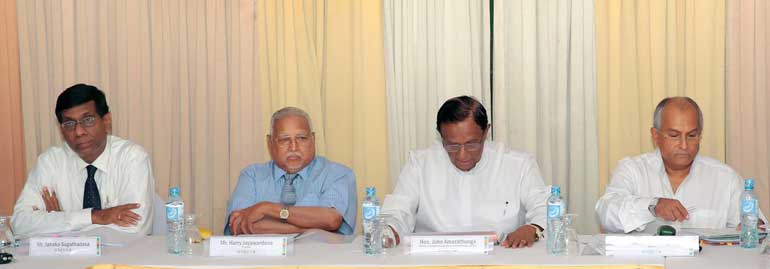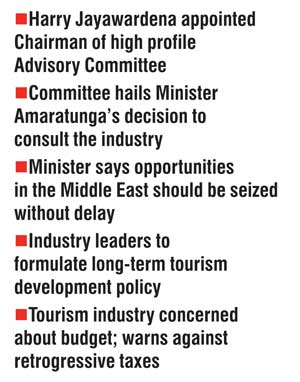Tuesday Feb 24, 2026
Tuesday Feb 24, 2026
Monday, 16 November 2015 00:00 - - {{hitsCtrl.values.hits}}

Inaugural Tourism Advisory Board meeting in progress

From left: Tourism Development Ministry Secretary Mr. Janaka Sugathadasa, Tourism Advisory Board Chairman, Mr. Harry Jayawardena, Minister of Tourism Development and Christian Affairs, John Amaratunga and Advisor to the Ministry, Mr. Felix Rodrigo

The first meeting of the newly appointed Tourism Advisory Board took place on November 11 at the Ministry of Tourism Development and Christian Religious Affairs.
The meeting which was chaired by Minister John Amaratunga was attended by all the newly appointed board members. Mr. Harry Jayawardena was appointed Chairman of the high profile board.
The board members who represent the biggest names in the travel and tourism sector in the country hailed the decision of the Minister to move away from past practice and work with the industry. “The Minister made a vital decision by appointing this committee. It should be lauded. This is the first time that the captains of the travel and tourism industry have been consulted and brought together in the form of a board to charter the way forward,” noted Mr. Jayawardena.
Those present at the inaugural meeting were Mr. Harry Jayawardena, Ministry Secretary Mr. Janaka Sugathadasa, Chairman Tourism Development Authority and Acting Chairman of the Tourism Promotions Bureau Mr. Paddy Withana, Advisor to the Ministry Mr. Felix Rodrigo, Mr. Merril Fernando, Mr. Ajith Gunawardena, Mr. Amal Cabraal, Mr. Dammika Perera, Mr. Udaya Nanayakkara, Mr. Sunil Dissanayake, Ms. Shiromal Cooray, Mr. Ashroff Omar, Mr. Abbas Eusufallly, Mr. Sanjiv Gardiner and Mr. Suren Ratwatte.
The board is tasked with three main duties: advice the Minister and the institutions under the Ministry of Tourism Development on any matter connected to the development of travel and tourism; charter the future course of the industry; and respond to any matter that is put to the committee by the Minister.
Welcoming the board members, Minister John Amaratunga said his main goal is to make tourism the number one foreign exchange earner for the country in the shortest possible time. He said it was after much thought and extensive discussions with officials that he decided to appoint the biggest names in the industry to the board. He called upon the board members to get on the fast track and achieve the best possible results starting with the forthcoming winter season.
“This is an industry that can bring in immediate foreign exchange to Sri Lanka, provided we tap the right markets, and with your experience, expert knowledge and know-how, I’m more than sure you will assist me, the Ministry and the country with new ideas and practical, workable solutions to this industry so as to take advantage of the present opportunities in the world market.”
Minister Amaratunga drew attention to the crisis in the Middle East where Russian tourists have been debarred from travelling to the region. “Problems in Tunisia, Libya, Egypt, Syria, Morocco, Yemen and Iraq have effectively shut the door to tourists and no insurance company will issue a policy to passengers travelling to these countries. Therefore, it is the right time for Sri Lanka to move forward and grab the opportunity. Now Saudi Arabia is also in turmoil. The only available option for Russian tourists is to travel to our part of the world, where there is freedom, peace, sun and sea, which the Russians love. The world is our market right now. We are in a strong position as there is a steady government and friendly policies. However we must play our cards correctly and do the right thing at the right time.”
The Minister noted that in order to fill up hotel rooms and strengthen the industry, a long term policy was needed. “I call upon this committee to formulate a long-term policy and advise us on how to move forward. You should take full responsibility and be mindful of the duty cast on you to take the industry forward to benefit the people of Sri Lanka.”
Minister Amaratunga assured the industry leaders that he will not leave any stone unturned in achieving the maximum results, not only in the short term but also in the long term. “I will assist all industry stake-holders, big or small to grow and sustain the industry. This is a 100 percent private sector oriented industry and the government is the only facilitator, regulator and monitoring authority.
Therefore, the private sector has to perform. The government will provide all possible assistance and remove the barriers that hinder growth.”
Focusing on the large number of rooms under construction and the entrance of some big international hospitality brands, Minister Amaratunga said, “I’m confident that with your assistance I could play a big role in attracting the much needed foreign currency into the country. For this, we need to have a permanent plan in place and this is the right time for it. We need a good programme and a good campaign.”
Meanwhile the committee members raised concerns about the upcoming budget. They said there was talk of reintroducing BTT in place of VAT and if this was done it would deal a massive blow to the industry. They called on the government not to change the present tax structure as it would impede all growth. The Minister assured the committee that he would convey their concerns to the Prime Minister, who was the minister in charge of policy.
Mr. Jayawardena said that any immediate increase in tax will also adversely affect the industry as most rooms had already been sold for the next year based on the current tax structure. He said any tax increase should become effective after a one year grace period.
Tourism Development Ministry Secretary Mr. Sugathadasa said the government has placed much emphasis on the development of the tourism sector and the recent policy statement of the Prime Minister which had an entire chapter dedicated to tourism, outlined this importance.
Mr. Jayawardena pointed out that the government should think twice about imposing ad hoc taxes and increasing the red tape through such measures. He said this had been the bane of the industry in the past. “The need of the hour is stability through consistent policies that do not change every year. The red tape must be minimized. It takes only five days for a new hotel project to be approved in Oman. We take months. This aspect needs to be addressed,” he said.
Concluded